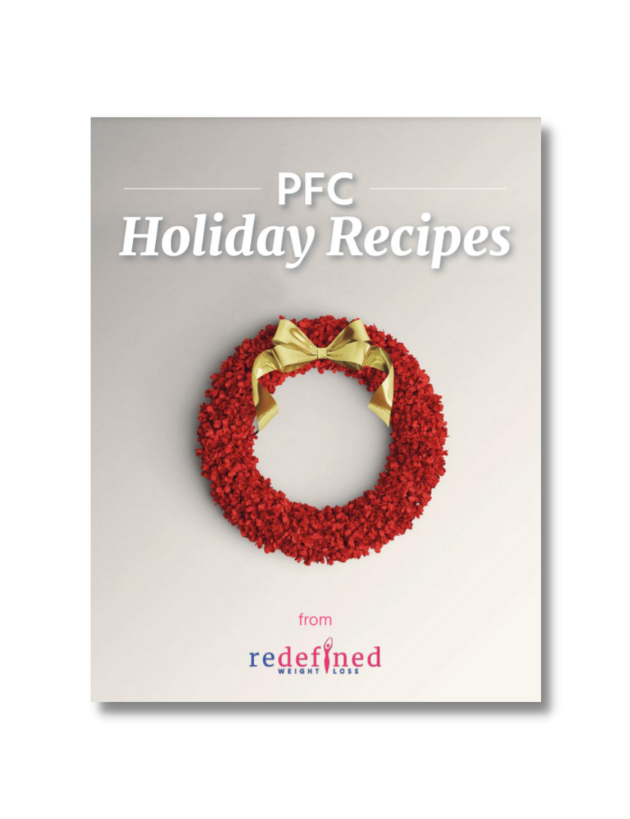It’s the most wonderful time of the year: That delightful season full of gift giving, family, friends—and all of their opinions about your eating habits.
You know, when your mom announces your new dietary restrictions to the family, your Uncle Steve makes jokes about how much weight you’ve lost (or gained) (or haven’t), and Aunt Jennifer declares a life without bread is a life not worth living.
And unfortunately, Aunt Jennifer’s colorful opinion of your new protocol does not come with a gift receipt, and Mom’s announcements and Uncle Steve’s jokes aren’t exactly delivered with a bow on top.
That pressure can leave you feeling like there are only 3 good options:
1. Just give in and eat, knowing you’ll feel terrible later. But when in Rome…
2. Filibuster dinner with a long, impassioned speech about the power of real food. (If you can’t eat in peace, no one will.)
3. Put vaseline on your teeth to force a permanent smile, stick to your guns, and add a heaping dash of irritation and isolation to your otherwise delicious plate.
Your family and friends most likely have the best of intentions. They haven’t seen your struggles, don’t know what it feels like to be inside your body, and don’t know how much better it feels to eat foods that fuel you.
…But we also don’t have to just grin and bear it. You deserve to stand confidently in your eating choices without having to flip a table or choke down food that makes you feel awful.
Here are the top five food bombs your family may lob at you this holiday season—and the easiest ways to diffuse them!
Comment #1: “Why don’t you just take a Lactaid?”
If only it were that simple. This one is frustrating because it reduces all reactions to one symptomatic response. Plenty of people can’t handle dairy, for example, but it’s not always the lactose that’s the problem. And even if it is, when it comes to serious food intolerances, that statement can feel an awful lot like asking someone to jump out of a plane and saying, “Just wear a helmet!”
Your response? Keep it light and redirect the convo.
TRY THIS: “Thanks, but the risk isn’t worth the reward. Since we’re eating, I’ll spare you the details.”
Shut down any talk of your body and how it responds firmly but politely—it will remind them what they’re actually asking. And if they have any sense, they’ll back off.
And for those particularly pushy relatives?
TRY THIS: “You may be comfortable discussing this, but I’m not. So let’s drop it and eat.”
Comment #2:“Hey, nobody touch the [insert special food]! That’s for her—you know, for her special diet!”
“Don’t touch the Brussels sprouts! I made them for Jeannie because she can’t eat anything else.” Ugh.
The thought and effort is much appreciated, but now there’s a giant spotlight on your intestines.
TRY THIS: “Please help yourselves—I came prepared!”
Your best bet is to come in armed with a dish or two you know are compliant with your plan. See it as an opportunity to demonstrate how delicious healthy eating can be.
Or? Eat a snack beforehand. Not only will you face off with these comments with your blood sugar intact, but you can eat what you feel like eating, and not worry about hoarding all the sprouts for fear you’ll starve. Remind everyone that while you’re sure their green bean casserole is a showstopper, their company is the main event.
Comment #3:“Have you gained/lost weight?”
Why anyone ever thinks it’s appropriate to comment on anyone else’s weight is beyond me. If you want to pay me a compliment, tell me how great I look.
Let’s leave the scale out of this—because anyone who has made a serious change to their nutrition knows the scale should ultimately have no place in how you feel. It’s just a number.
TRY THIS: “I don’t know. I just know I’m feeling a whole lot better!”
Shift the focus back to all the emotional, mental, and physical benefits of how you’re eating. Emphasize how much healthier and happier you feel, how much more energy you have, how comfortable you feel in your own skin.
And if you’re not there yet, let them know how good it feels to pursue a healthier, happier, more energetic version of yourself.
Comment #4:“I could NEVER do what you’re doing. I love food too much.”
What they’re really saying is, “This is the only way I know how to love myself, and change is scary.”
TRY THIS: “I’ve found that I love food on two levels—how it tastes and how it makes me feel. I’ve spent a lot of time loving how things taste without really exploring how they make me feel. Now I’m giving my body a chance to talk back for awhile.”
When you frame your choices as an exploration or journey—instead of a decree or judgment—you’ll find that people approach you with more wonder, curiosity and acceptance.
Comment #5: “I couldn’t live in world without bread.”
This makes my head spin. You couldn’t LIVE? Truly? If tomorrow, the globe announced that there was no more bread, you’d just say, “This is my exit”?
All snark aside, the things we crave most can often be signaling what is actually causing the most inflammation and discomfort.
Most people are only thinking about how good they think bread (or cheese or pasta) tastes. They’re not thinking about the symptoms you experience when you eat them—the brain fog, depression, bloat, pain, fatigue, etc.
TRY THIS: “Well, for me, a world with bread is a pretty painful experience. I’ve tried suffering through it, and now I’m seeing what it’s like to live pain-free.”
Bottom line: You don’t need to defend your choices or convert anyone to your way of living. The goal, especially for a family get together, is to keep the conversation light, positive, and moving along. You can make it through this meal with your dignity and your relationships in tact!
To make the holiday season even easier, grab some recipes for yourself by clicking the green button below!











